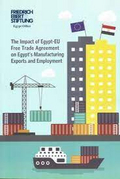The impact of Egypt-EU free trade agreement on Egypt's manufacturing exports and employment
Helmi, Omneia / Nora Aboushady / Chahir ZakiExterne Publikationen (2018)
Cairo: Friedrich Ebert Stiftung/Egypt Office
Reshaping the Euro-Mediterranean relations became a necessity in the aftermath of the Arab Spring in several South Mediterranean Countries (SMCs), including Egypt. The objective of this paper is therefore to study the impact of Egypt-EU Association Agreement on the manufacturing sector and to point out industries with strong potential for export growth and job creation. We also analyze opportunities for enhancing Egypt-EU investment and trade and –eventually– paving the way for a Deep and Comprehensive Free Trade Agreement (DCFTA) in light of the urgent need for social justice in the region. To do so, we proceed in three ways. First, we undertake a descriptive analysis of trade and investment flows. Second, we run a gravity-type model to examine the impact of Egypt-EU trade agreement on their bilateral trade and to determine the most sensitive products that are affected by the agreement. Finally, we construct an index for Egypt’s main exports taking into account trade, employment and gender dimensions. We found that fertilizers are one of the most significant products that experienced increases in their market share, are sensitive and are labor intensive.

